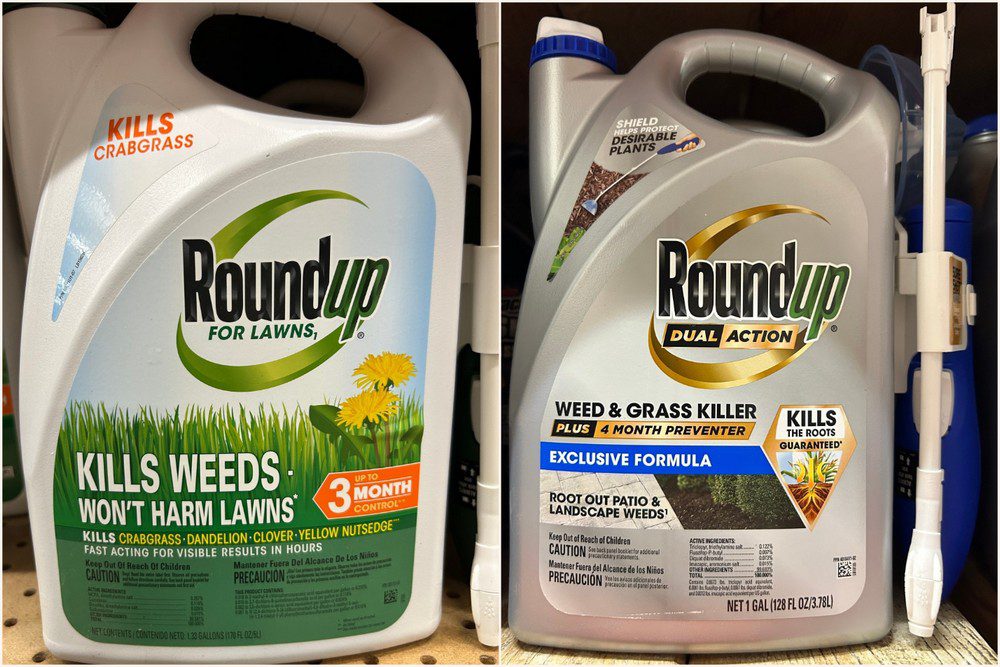

None of these products contain glyphosate.
Like all reasonably knowledgeable gardeners, I thought I knew what’s in the most commonly used herbicide in history, but not anymore. Take a look at the ingredient list for the “Roundup” products at your local box store.
Since the 1973 launch of the non-selective herbicide glyphosate by Monsanto, it’s been marketed under the name Roundup and became wildly popular in agriculture (to kill weeds in fields of GMO Roundup-ready crops), in invasive plant clean-ups and also to kill weeds in regular home gardens.
But since the patent for glyphosate expired in 2000, other companies began selling glyphosate under their brand names, though Roundup remained the top brand for glyphosate.
But then in 2018 Bayer took over Monsanto and decided to limit glyphosate sales to consumers (due largely to legal problems with glyphosate). As a result, Roundup products contain other herbicides, not glyphosate.
So if you’re buying Roundup this season hoping to get glyphosate, don’t count on it. I stopped by a Home Depot and easily found the four Roundup products shown here, NONE of which contain glyphosate. For three of them the active ingredient is Triclopyr, and the fourth contains a bunch of chemicals I don’t recognize, but no glyphosate.
Triclopyr, like glyphosate, is a broadleaf weed killer but – and here the research results seem to be all over the place, depending on the continent – triclopyr appears to linger longer in the soil – as long as six weeks – and poses a risk to landscape plants and vegetables. (See
EPA on glyphosate and the
EPA on Triclopyr. Results by European sources probably differ.)
I found out about this sneaky bit of legal strategy from my plant sciences professor at the U. Maryland professor, and other than that I’ve just seen one post on Facebook about it – by Janet Carson and shared by Carol Reese. Janet advises her followers to read
this fact sheet from U. Tennessee that explains the various pesticide formulae.
But what boggles my mind is the company’s decision to keep the Roundup name for their new products, given the very bad name that “Roundup” has acquired in my world over the last decade, at least. My professor explained that “Roundup” was deemed too valuable and well known a brand to abandon. Seriously? I must live in a bubble.
RFK Jr. Targets Glyphosate and Others
While there’s no way I can keep track of everything the new administration is doing, I did spy one
article in the New York Times about upcoming changes in the world of pesticides in the era of HHS Secretary RFK Jr.
As part of his pledge to “Make America Healthy Again,” Robert F. Kennedy Jr. has said he wants to build an “off-ramp” from the country’s reliance on insecticides and herbicides to grow food.
“The chemicals pollute our bodies the same way that they pollute the soil,” Mr. Kennedy said in 2024. This week, Mr. Kennedy, now the federal health secretary, said that a commission established by President Trump to examine chronic disease rates would look into the use of pesticides, as well as childhood vaccines, microplastics and more.
Mr. Kennedy’s opposition to herbicides, particularly a widely used chemical called glyphosate, has earned support from some environmental advocates, so-called “MAHA moms” and wellness influencers. But some of the claims he and others have made about glyphosate — including that it is potentially linked to cancer, gluten allergies and a variety of other health issues — are based on science that is still not settled.
A columnist for the Des Moines Register say RFK “despises glyphosate” and outlines how he could affect farming practices.
More targeted research, please
When it comes to the potential dangers of Roundup/glyphosate to home gardeners, I have to demur. I find the various scientific and bureaucratic conclusions about it to be confusing and inclusive, as they’re largely based on a much different use of the product – spraying it on our food. I just wish there were studies more relevant to how we might use herbicides, including glyphosate.
Roundup isn’t what you think it is anymore originally appeared on GardenRant on February 23, 2025.
The post Roundup isn’t what you think it is anymore appeared first on GardenRant.
* This article was originally published here


